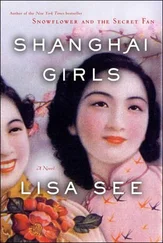Lisa See - Peony in Love
Здесь есть возможность читать онлайн «Lisa See - Peony in Love» весь текст электронной книги совершенно бесплатно (целиком полную версию без сокращений). В некоторых случаях можно слушать аудио, скачать через торрент в формате fb2 и присутствует краткое содержание. Жанр: Старинная литература, на английском языке. Описание произведения, (предисловие) а так же отзывы посетителей доступны на портале библиотеки ЛибКат.
- Название:Peony in Love
- Автор:
- Жанр:
- Год:неизвестен
- ISBN:нет данных
- Рейтинг книги:4 / 5. Голосов: 1
-
Избранное:Добавить в избранное
- Отзывы:
-
Ваша оценка:
- 80
- 1
- 2
- 3
- 4
- 5
Peony in Love: краткое содержание, описание и аннотация
Предлагаем к чтению аннотацию, описание, краткое содержание или предисловие (зависит от того, что написал сам автор книги «Peony in Love»). Если вы не нашли необходимую информацию о книге — напишите в комментариях, мы постараемся отыскать её.
Peony in Love — читать онлайн бесплатно полную книгу (весь текст) целиком
Ниже представлен текст книги, разбитый по страницам. Система сохранения места последней прочитанной страницы, позволяет с удобством читать онлайн бесплатно книгу «Peony in Love», без необходимости каждый раз заново искать на чём Вы остановились. Поставьте закладку, и сможете в любой момент перейти на страницу, на которой закончили чтение.
Интервал:
Закладка:
“Peony, where is your peony?” one of our guests asked.
“It’s her name,” Third Aunt confided to the others, “but she never practices her petal work.”
This contest was followed by one for chrysanthemums, another for plum blossoms, and finally for orchids. I surreptitiously laid my painting on the table. My orchids were too heavy and another girl won the competition. Next came paintings with butterflies, and finally butterflies and flowers together. I didn’t enter either of those categories.
Always the same flowers and butterflies, I thought to myself. But what else could we paint? Our paintings were about what we could see in the garden: butterflies and flowers. Standing there, looking at the beautifully powdered faces of my aunts, cousins, and our female guests, I saw wistful longing. But if I was looking at them, they were observing me too. My mooning did not escape the notice of the other women, who were all trained to spot weakness and vulnerability.
“Your Peony seems to have been overcome by spring sickness in summer,” Fourth Aunt remarked.
“Yes, we have all noticed the heightened color on her cheeks,” Third Aunt added. “What could be on her mind?”
“Tomorrow I will pick herbs and brew a tea to ease her spring sickness,” Fourth Aunt offered helpfully.
“Spring sickness in summer?” my mother echoed. “Peony is too practical.”
“We like to see your daughter this way,” Second Aunt said. “Perhaps she will confide her secrets to the other girls. They all wish to have romantic thoughts too. Every girl should look this pretty on her sixteenth birthday. Five more months to her marriage. I think we can all agree she is ready to be plucked.”
I tried as hard as possible to make my face as unfathomable as a pond ( 4 8 )
on a humid summer night. I failed, and some of the older women tittered at my girlish embarrassment.
“Then it’s a good thing she’s marrying soon,” my mother agreed, in a deceptively light tone. “But you’re right, Second Aunt, maybe she should speak to your daughter. I’m sure that Broom’s husband would be grateful for any improvement on their wedding night.” She clapped her hands softly. “Now come, let us go to the garden for our final contests.”
As the other women filed out, I felt my mother’s eyes on me—
weighing and considering what had been said. She didn’t speak and I refused to meet her eyes. We were like two stone statues in that room. I was grateful she’d protected me, but to say that would be to admit . . . what?
That I was lovesick? That I’d met someone in the Riding-the-Wind Pavilion the last two nights? That I planned to meet him tonight in the Moon-Viewing Pavilion, a place on our property I was not allowed to go?
Suddenly I realized I’d changed in a fundamental way. Monthly bleeding doesn’t turn a girl into a woman, nor does betrothal or new skills. Love had turned me into a woman.
I called upon my grandmother’s poise and dignity, and without saying a word I lifted my head and walked out the door and into the garden.
I sat on a porcelain jardinière. The garden looked very pretty, and much of the inspiration for this last round of contests would come—as usual—from what we could see. My cousins and aunts offered bits of poetry from famous women poets that invoked the plum blossom, chrysanthemum, orchid, and peony. So many lovely words for such beautiful and evocative flowers, but I scrolled through my memory until I came to a dark poem that had been written on a wall in Yangzhou by an unknown woman during the Cataclysm. I waited until the others had recited their poems and then I began to speak in what I imagined to be the sorrowful voice of that desperate writer:
“The trees are bare.
In the distance, the honks of mourning geese.
If only my tears of blood could dye red the blossoms of the plum tree.
But I will never make it to spring.
My heart is empty and my life has no value anymore.
Each moment a thousand tears.”
This poem—considered one of the saddest of the Cataclysm—reached deep into everyone’s hearts. Second Aunt, still upset over her daughter’s ( 4 9 )
footbinding, once again shed tears, but she wasn’t the only one. Great feelings of qing filled the garden. We shared in the despair of that lost and presumably dead woman.
Then I felt my mother’s eyes piercing me. All color had drained from her face, making her rouge stand out like bruises on her cheeks. Her voice was barely audible as she said, “On this beautiful day my daughter brings misery into our midst.”
I didn’t know why Mama was upset.
“My daughter isn’t feeling well,” Mama confided to the mothers around her, “and I’m afraid she’s forgotten what’s proper.” She looked back at me. “You should spend the rest of the day and evening in bed.”
Mama had control over me, but was she really going to keep me from the opera because I recited an unhappy poem? Tears gathered in my eyes.
I blinked them back.
“I’m not sick,” I said, rather pathetically.
“That is not what Willow tells me.”
I flushed with anger and disappointment. When she’d emptied the chamber pot, Willow must have seen that I’d thrown up and told my mother. Now my mother knew I’d failed—once again—as a soon-to-be wife and mother. But this knowledge didn’t chasten me. It made me very determined. I wouldn’t let her keep me from my meeting in the Moon-Viewing Pavilion. I brought a forefinger to my cheekbone, inclined my head, and drew my features into the prettiest, blankest, most harmless picture of a Hangzhou maiden.
“Oh, Mama, I think it is as my aunties have said. On the day we honor the Weaving Maid I have let my mind drift to the celestial bridge that will be formed tonight for the two lovers to meet. I may have had a momentary case of spring feelings, but I don’t have spring fever, aches of any sort, or any womanly complaints. My lapse is only an indicator of my maiden status, nothing more.”
I appeared so innocent, and the other women looked at me with such benevolence, that my mother would have had a hard time sending me away.
After a long moment, she asked, “Who can recite a poem with hibiscus in it?”
Everything—as it was every day in our women’s quarters—seemed a test of some sort. And every test reminded me of my inferiority. I didn’t excel at anything—not footbinding, or embroidery, painting, zither playing, or reciting poetry either. How could I go to my marriage now when I ( 5 0 )
loved someone else so deeply? How could I be the wife my husband deserved, needed, and wanted? My mother had followed all the rules, yet she’d failed to give my father sons. If Mama had been unsuccessful as a wife, how could I ever succeed? Maybe my husband would turn away from me, embarrass me in front of my mother-in-law, and find delights in the singing girls around the lake or by taking in concubines.
I recalled something Mama liked to repeat: “Concubines are a fact of life. What matters is that you choose them before your husband does, and then how you treat them. Don’t hit them yourself. Let him do it.”
That was not what I wanted for my life.
Today was my sixteenth birthday. Tonight, in the heavens, the Weaving Maid and the Cowherd would be reunited. In our garden, Liniang would be resurrected by Mengmei’s love. And in the Moon-Viewing Pavilion, I would meet my stranger. I may not have been the most perfect young woman in all of Hangzhou, but under his gaze I felt I was.
( 5 1 )

Soiled Shoes
Читать дальшеИнтервал:
Закладка:
Похожие книги на «Peony in Love»
Представляем Вашему вниманию похожие книги на «Peony in Love» списком для выбора. Мы отобрали схожую по названию и смыслу литературу в надежде предоставить читателям больше вариантов отыскать новые, интересные, ещё непрочитанные произведения.
Обсуждение, отзывы о книге «Peony in Love» и просто собственные мнения читателей. Оставьте ваши комментарии, напишите, что Вы думаете о произведении, его смысле или главных героях. Укажите что конкретно понравилось, а что нет, и почему Вы так считаете.












